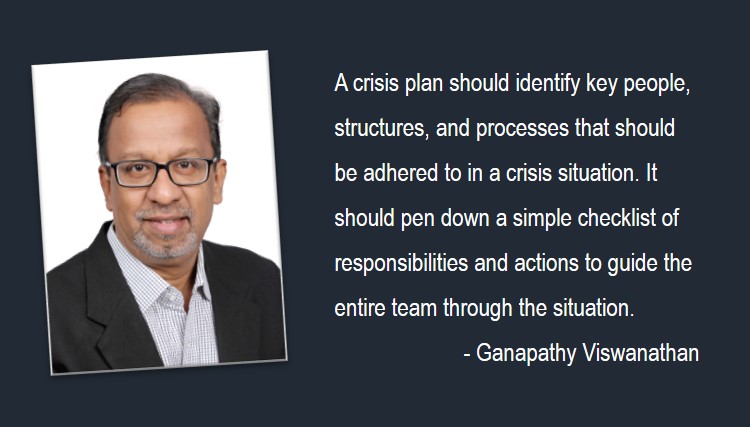Crisis in a corporate can erupt any time and it usually arrives without any warning. One should not press the panic button but instead act rapidly to douse the fire in a systematic manner. So, to handle a crisis it is important that the corporate must put in place a robust plan and process which one should follow to minimise the damage.
To understand better and handle crisis situation before the situation goes out of control here are some important tips. Today the crisis could be in the area of people but tomorrow it could be sexual harassment or financial embezzlement. But end of the day it all boils to how efficiently and smartly we encounter crisis.
Prepare a plan
First thing first, put together a plan. The key objective of a crisis action plan is to ensure that you can deal quickly and effectively to minimise the negative impact of any event which threatens to erode the image of the company, brand and the business. The plan should identify key people, structures, and processes that should be adhered to in a crisis situation. By defining these processes upfront and rehearsing them, you can cut down the confusion if such a situation occurs.
The plan should pen down a simple checklist of responsibilities and actions to guide the team through the crisis. It should also provide a defence against some of the errors that can worsen the situation.
Form a crisis team
The crisis team provides the core decision making to the crisis committee. Team members will be allocated specific function to fulfill in the team and are selected for their skills and experience. The crisis team will be responsible for all communications, both internally and externally, regarding the crisis. They have the authority to act as they see fit in order to diffuse the situation.
The key roles in a crisis team may include:
- Crisis Captain or Leader
- Spokesperson
- Legal counsel and support
- Media liaison
- Intelligence gatherer
- Technical expertise and support
The crisis team must be available at a short notice. A crisis can erupt any time, especially in the age of internet and social media. Hence the team member must be accessible 24X7 and must assemble at a short notice in case of super emergency.
10 cardinal principles to handle crisis professionally
- Keep calm and establish the facts. Are they accurate? Who is responsible? Are we taking the necessary actions to remedy the situation? How fast do we need to respond, and to whom? When we have these answers, then we will be ready to respond. Not until then.
- Agree and decide who will be your spokesperson. Decide this in advance.
- Share all your contact numbers. Brief your lawyers and keep them on standby.
- Agree on messages, activities and audience. What we are going to say and how we are going to say it?
- Ensure all emails and technology of the company works.
- Avoid any senior client interference on changing the message after the wave.
- Ensure all media facing people are media trained.
- Record all calls and interviews regarding the crisis.
- Ensure that the corporate communication team knows first when the crisis erupts.
- Keep handy the list of journalists who are not a friend of the company.
In today’s day in age with crisis exploding rapidly due to social media and various online media it will be good to set up some mechanism to know the news fast. If there are good budgets available align with a digital or news agency to monitor your online news and to get to know the day’s activity very quickly. Crisis needs to be handled with kid glove and tons of patience, sharp focus and the right strategy.
The views expressed here are that of the author and do not necessarily reflect that of Reputation Today.







Be the first to comment on "Crisis Preparedness – Why being crisis ready is business smart"